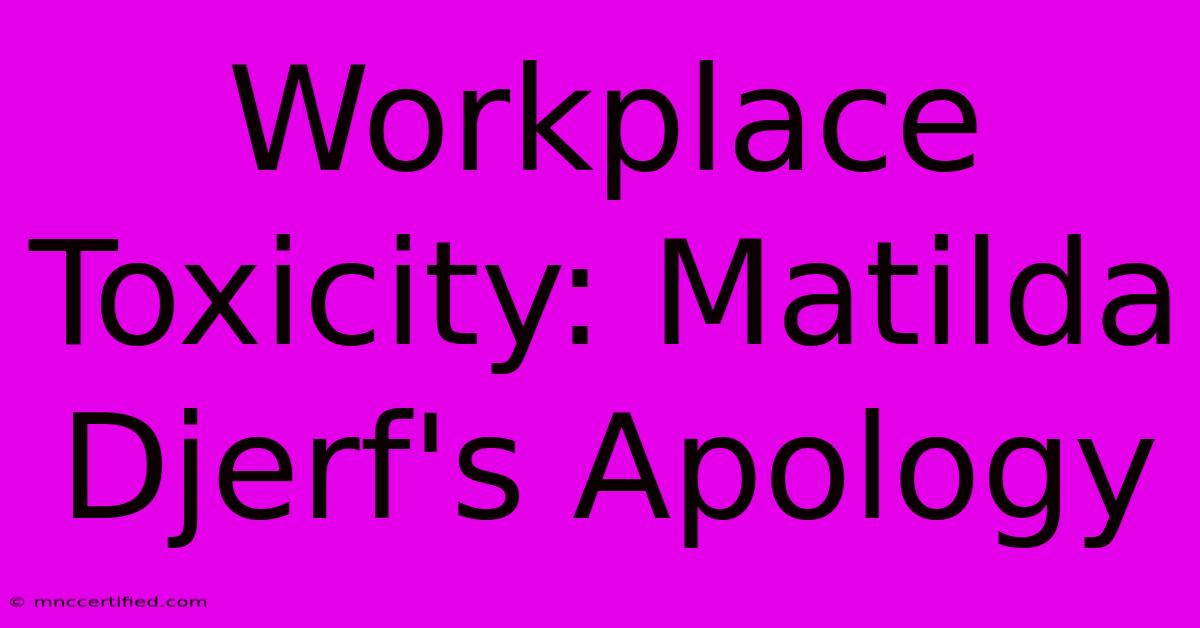Workplace Toxicity: Matilda Djerf's Apology

Table of Contents
Workplace Toxicity: Matilda Djerf's Apology and the Importance of Accountability
Matilda Djerf, the hugely popular Swedish influencer, recently found herself at the center of a controversy surrounding allegations of workplace toxicity. Her subsequent apology, while welcomed by some, sparked further debate about the nature of accountability and the challenges of fostering positive work environments, particularly within the highly competitive influencer industry. This article delves into the specifics of the situation, analyzing Djerf's apology and exploring its broader implications for workplace culture.
The Allegations and the Backlash
Numerous former employees of Djerf's company, Matilda Djerf Group, came forward with accounts detailing alleged instances of bullying, harassment, and exploitative working conditions. These allegations painted a picture of a demanding and often emotionally draining work environment, where employees felt pressured to prioritize long hours and personal sacrifices over their well-being. The accusations, shared across various social media platforms and online forums, quickly gained traction, leading to a significant backlash against Djerf and her brand. The detailed accounts highlighted issues such as:
- Unreasonable workload and expectations: Employees reported consistently exceeding their contracted hours without adequate compensation or recognition.
- Lack of work-life balance: The demanding nature of the job allegedly left little room for employees’ personal lives and mental health.
- Bullying and intimidation: Several accounts described instances of aggressive behavior, verbal abuse, and a generally hostile work environment.
- Lack of support and communication: Employees reported feeling unsupported and unheard, with minimal communication and feedback from management.
These accusations significantly damaged Djerf’s public image, prompting calls for greater transparency and accountability within the influencer industry. The incident serves as a stark reminder of the potential negative consequences of prioritizing growth and profit over employee well-being.
Matilda Djerf's Apology: A Critical Analysis
Following the wave of criticism, Djerf released a public apology via her social media channels. While acknowledging the seriousness of the allegations, the apology's effectiveness has been met with mixed reactions. Some praised her willingness to take responsibility, while others criticized its perceived lack of depth and concrete commitment to change. Key aspects of the apology to consider include:
- Acknowledging the harm caused: The apology's success hinges on acknowledging the pain and suffering inflicted on former employees. A genuine apology necessitates acknowledging the validity of the complaints without making excuses.
- Specificity and detail: A vague apology lacks impact. A detailed acknowledgement of specific problematic behaviors and practices builds credibility and shows a genuine commitment to improvement.
- Commitment to change: A meaningful apology must include tangible steps to prevent similar situations in the future. This might include implementing new policies, offering training on workplace ethics, and establishing clear communication channels for employee feedback.
- Taking accountability: Accepting personal responsibility for the creation of a toxic work environment is crucial. Shifting blame or minimizing the severity of the situation undermines the apology's effectiveness.
Djerf’s apology, although a step in the right direction, requires further critical examination concerning the level of specificity and the detailed plan for reform. The lack of concrete steps to address the underlying systemic issues remains a point of contention for many.
The Broader Implications: Workplace Culture and Accountability in the Influencer Industry
The Matilda Djerf controversy highlights a significant issue within the influencer industry – the lack of robust regulations and ethical standards governing workplace practices. The often-blurred lines between personal brand and business operations can create environments where exploitative practices are normalized. This case underscores the need for:
- Increased transparency and accountability: Influencers should be held to the same standards of workplace conduct as businesses in other sectors.
- Improved employee protection: Legislation and industry-wide standards should protect employees from exploitation and ensure fair working conditions.
- Promoting a culture of well-being: Prioritizing employee mental health and well-being should be a core value for all influencers and businesses.
- Independent investigations: External investigations can provide objective assessments of workplace environments and hold companies accountable for misconduct.
The situation involving Matilda Djerf serves as a cautionary tale, demonstrating the crucial need for ethical conduct and responsible business practices within the influencer community and beyond. It highlights the importance of fostering healthy workplace cultures where employees feel safe, respected, and valued. The long-term success of any business, including those in the influencer sphere, depends on prioritizing employee well-being and creating a positive and productive work environment.

Thank you for visiting our website wich cover about Workplace Toxicity: Matilda Djerf's Apology. We hope the information provided has been useful to you. Feel free to contact us if you have any questions or need further assistance. See you next time and dont miss to bookmark.
Featured Posts
-
Meet Mark Cavendishs Family
Dec 18, 2024
-
Hodgkinson Wins Sports Award 2024
Dec 18, 2024
-
North Honors Rnli Lifeboat Crew
Dec 18, 2024
-
Life Imprisonment For Saras Killers
Dec 18, 2024
-
Abundant Life School Shooting Motive Update
Dec 18, 2024